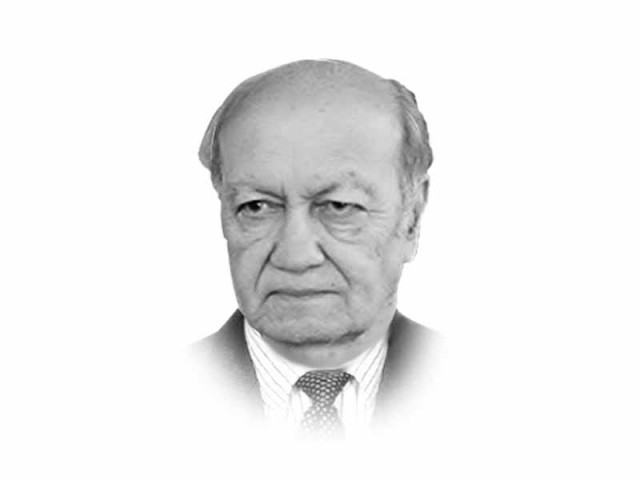Time to resume dialogue
BJP’s convincing victory in UP and Uttarakhand has firmly placed Modi as the current unchallenged leader of India

The writer is a retired lieutenant general of the Pakistan Army and a former federal secretary. He has also served as chairman of the Pakistan Ordnance Factories Board
Victory in state elections will provide Modi the political capital to undertake major economic and administrative reforms that he and his party have planned. Obviously, for Congress and especially for Rahul Gandhi the election fiasco has been a huge setback as they were able to only retain Punjab. In Goa that gave a split mandate, BJP has staked claim to form government in alliance with other parties. More significantly, it has raised serious doubts if Rahul will be able to effectively lead the party in future. The Congress party has been so closely associated with the Nehru family and a victim of dynastic politics that it has lost its dynamism and appeal. For Pakistanis this phenomenon is familiar, as PPP has met a similar fate being reduced essentially to rural Sindh. May be the dismal performance of Congress shakes its leaders to reform and reorganise.
The question is what does BJP’s win in state elections mean for Pakistan. Will it further embolden Modi to take an aggressive stand and continue with his campaign to isolate Pakistan? Or will it give him the confidence to engage with it in a more rational and less belligerent manner. There is a school of thought that Modi stepped up his anti Pakistan rhetoric to boost his party’s position in the state elections. It is, however, doubtful if relations with Pakistan played any significant role in influencing the voting pattern apart from reinforcing Modi’s image as a strong leader. Moreover, by now PM Modi should have come to realise that isolating Pakistan is not a feasible proposition. If any evidence of that is needed the recent Economic Cooperation Organisation Summit in which with the exception of Afghanistan, and that too at India’s behest, all nine countries were represented either by their Presidents or Prime Ministers. In addition Pakistan’s strategic relationship with China and its close ties with Turkey, Saudi Arabia and several Middle-Eastern and European countries is a manifestation of the reality that a country of 200 million people and geo-politically important cannot be isolated. All it does is to generate more ill will between us. Not to mention that every time tensions between the two nuclear-armed neighbours escalate they raise serious concerns internationally.
India has been resorting to heavy and sustained firing across the Line of Control and working boundary to build pressure on Pakistan. This has led to Pakistan taking retaliatory measures and the vicious cycle continues with casualties of innocent civilians taking place. But this is not a solution to the existing logjam nor is it an answer to control infiltration of Jihadi elements. Operationalising the Cold Start doctrine can turn hazardous with unintended consequences.
For Pakistan too it provides a fresh opportunity to reassess how to engage with India. Modi’s insistence that India will only talk about terrorism indicates that Pakistan has not taken sufficient steps to control the activities of LeT. Now that Hafiz Saeed that India claims as the Mumbai attacks mastermind has been put under house arrest in Lahore under the Anti-Terrorism Act and his movement restricted and funds frozen, India should be prepared to engage in dialogue. It is possible that once dialogue resumes and Pakistan is provided additional evidence, legal proceedings against LeT could proceed and remove this major source of contention. New Delhi’s entire focus to alter the modalities of the dialogue process around the issue of terrorism is to deny Pakistan the opportunity to discuss other vital issues. Another factor that is influencing India to maintain this hostile posture toward Pakistan is the US and Western support it is getting as a rising major power.
Despite these advantages, Modi’s government cannot continue to ignore the reality of what is happening in Kashmir and deflect world attention by using the pretext of militancy. By not seriously addressing the grievances and genuine demands of Kashmiris India has been providing a fillip to militancy. Modi government’s overreaction and cancellation of bilateral talks last year after a meeting between our High Commissioner in India and leaders of Hurriyat resulted in increasing tension. This only shows India needed an excuse to suspend talks as such meetings were taking place in the past without much fuss. Modi’s acerbic attitude toward Pakistan has only made matters worse. Prime Minister Nawaz Sharif despite opposition from, influential quarters has shown his governments willingness to engage in meaningful dialogue with India. The army leadership too is not averse to talks and its main focus is to fight terrorism and if relations with India improve it can focus on the internal threat. On the contrary, if the status quo continues it will be harmful for the entire region. Already we can see its adverse impact on Afghanistan and it could get worse. It is time both sides resume engagement at the diplomatic level to first deescalate and prevent skirmishes along the LoC. This should be followed by resumption of bilateral dialogue on all substantive issues including Kashmir and terrorism.
Published in The Express Tribune, March 15th, 2017.
Like Opinion & Editorial on Facebook, follow @ETOpEd on Twitter to receive all updates on all our daily pieces.














COMMENTS
Comments are moderated and generally will be posted if they are on-topic and not abusive.
For more information, please see our Comments FAQ